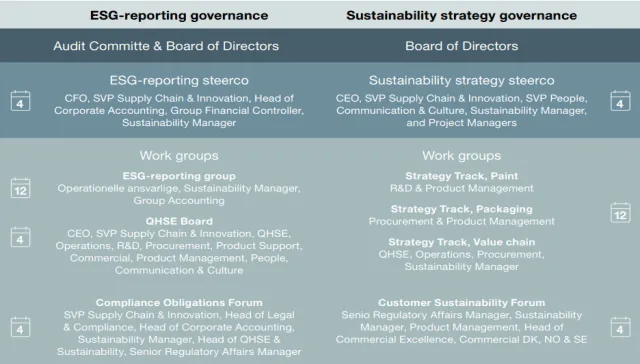Home / Investor / Corporate Governance
Corporate Governance
Find information about Flügger’s policies regarding corporate governance, stakeholder and investor relations, taxes, and climate and environment.
Corporate Governance at Flügger
The full Corporate Governance is unfortunately only available in Danish. However, you can find a summary in English below.
As part of a company’s disclosure obligations, NASDAQ OMX Copenhagen requires listed Danish companies to account for how they address the “Recommendations for Corporate Governance” prepared by the Corporate Governance Committee.
The Board of Directors at Flügger group has reviewed these recommendations. Generally, Flügger follows the recommendations, but there are a few exceptions:
- The Board has not approved an emergency plan for takeover bids, since such inquiries are handled directly by the main shareholder.
- No age limit has been set for Board members.
- The Board has chosen not to establish counsels and commissions. These are being taken care of by the entire Board.
- Flügger Group discloses remuneration for the Board and executives in the annual accounts, but not on an individual level.
Stakeholder & IR policy
Flügger has approved a Stakeholder and Investor Relations Policy. The purpose is to define the overall framework for stakeholder and investor relations activities in Flügger.
Purpose
The goal of Flügger’s stakeholder and IR activities is clear: to provide market participants with a realistic and up–to–date picture of Flügger as an investment case.
In order to achieve this, we provide existing and potential investors, the media, and analysts with factual, relevant and comprehensive information about the Group’s business and financial performance.
Activities
Stakeholder and IR activities specifically include dialogue with the stock market through company announcements, responses to enquiries, and participation at the annual general meeting. Furthermore, Flügger aims to communicate in an accessible, proactive and open manner.
In addition, the company complies with the current legislation and disclosure rules for listed companies on NASDAQ OMX Copenhagen.
Quiet Period
During the last four weeks before publishing financial statements or other price-sensitive announcements, Flügger observes a quiet period. Consequently, the company limits dialogue with market participants to ensure equal access to information in this specific period
Tax Policy
Flügger’s Tax Policy describes our approach to taxes, transfer pricing, relationships with tax authorities, tax incentives, and governance.

Accountability & Transparency
View more less
Flügger pays the taxes required by law and hence expected by legislators. In addition, the company emphasises transparency and accountability to comply with applicable tax regulations and thus follows recognised best practices.
Moreover, we support international initiatives that promote transparency, including those aligned with the UN’s Sustainable Development Goals and our own strategic sustainability initiatives.
Finally, Flügger aims to be transparent in taxation, ensuring that the company’s tax arrangements remain clear and justifiable at all times.

Approach to Tax
View more less
Firstly, the Group does not support nor engage in activities that – to Flügger’s knowledge – involve money laundering, tax evasion, nor attempts thereof. Furthermore, we do not establish or manage companies in tax havens, as defined by the EU’s list of non-cooperative jurisdictions for tax purposes.
Whistleblower System
Secondly, if suspicions arise concerning tax fraud, evasion, or other illegal activities, Flügger’s whistleblower system ensures proper handling. The whistleblower system is in accordance with EU legislation and national laws.
Thus in the whistleblower system, employees and other stakeholders associated with Flügger may submit anonymous or non-anonymous reports of serious matters, that they believe warrant attention. Meanwhile, an independent party manages the system, thus guaranteeing anonymity, security, and user-friendliness.
Business Structure
Finally, our business structures are based on commercial considerations and business substance. In addition, we do not establish artificial structures designed to avoid taxes. Instead, Flügger pays taxes where value is created, in accordance with OECD principles and both national and international tax legislation.

Transfer Pricing
View more less
We ensures appropriate profit allocation within the Group by following internationally recognised standards. These includes the OECD’s Transfer Pricing Guidelines (“TPG”) and local transfer pricing regulations.
Intercompany transactions
Furthermore, all intercompany transactions must comply with the arm’s length principle and/or local tax legislation. Thus these agreements and transactions must always be based on commercial rationale. However, while tax implications are considered, they cannot serve as the sole driver of business decisions.
Profit allocation
In practice, Flügger’s transfer pricing structure follows a principal model with the main entity located in Denmark. This means that profit allocation depends on where value is created within the Group. Consequently, the profit is distributed across administration, production, and sales units, based on benchmark studies of comparable companies.

Relationship to Tax Authorities
View more less
The Group maintains trusting and transparent relationships with tax authorities. Thus, we follow established procedures for the preparation and submission of required tax returns and associated documentation to tax authorities. Additionally, we respond accurately and promptly to inquiries from tax authorities.
Clarification and APA
If significant uncertainty arises regarding the application of tax rules to our business, we proactively seek clarification from the tax authorities. Whenever appropriately and feasible, we also aim to enter Advance Pricing Arrangements (“APA”) with the relevant tax authorities to secure predictability and consistency.
Handling complexity in legislation
Tax compliance can be complex, since legislation sometimes allows for different interpretations. Therefore, in cases where a practice for interpreting tax legislation has not yet been established, we seek guidance from both tax advisors and authorities. Consequently, Flügger only opt for tax solutions if there is more than a 50% likelihood that the tax treatment can be defended in court, should it be challenged by a tax authority.
Dispute resolution
If misunderstandings occur regarding facts or tax legislation, we cooperate with tax authorities to identify the issues and explore solutions. However, if disagreements cannot be resolved through dialogue with tax authorities, we settle our disputes in tax tribunals or courts to ensure proper tax treatment.

Tax Incentives
View more less
We acknowledge our responsibility to shareholders by striving to minimise costs and maximise earnings. Consequently, Flügger does not pay more tax than necessary required by law.
Tax incentives are government measures aimed at influencing corporate decision-making or encouraging companies to invest in a particular way. For instance, by reducing the tax burden associated with investments.
Moreover, Flügger seeks to use these incentives when they align with our business and operational goals. Thus, they contribute to enabling us to produce high-quality paint.
For example, we have utilised available tax incentives, such as increased basis for depreciation and grants for green investments as part of the modernisation of our facilities in Denmark and Poland.

Governance
View more less
Firstly, Flügger’s executive management oversees all tax affairs, while the Board provides monitoring.
Each year, the Board and the Audit Committee are provided with reporting on taxation. Additionally, The Board approves the tax policy, while the CFO holds the primary responsibility for its implementation.
Secondly, the CFO and the Group’s Accounting team manage operational tax matters. Furthermore, they are involved in major business restructurings. Thus enabling them to assess potential tax implications before commercial business decisions are made.
Finally, Flügger maintains internal processes to ensure compliance with applicable tax laws. Furthermore, the company continuously align with best practices to keep reporting consistent and reliable.
Climate & Environment Policy
Flügger’s Climate and Environmental Policy (the “Policy”) defines our commitment to reducing the environmental impact of Flügger group A/S and its subsidiaries (“Flügger”). Furthermore, it defines how we integrate sustainability across Flügger’s value chain.
Purpose
Fundamentally, the Policy combines Flügger’s core values and Flügger’s ambition to mitigate climate-related risks while maximizing opportunities in the transition to a low-carbon economy. Moreover, it provides a framework for compliance, accountability, and continuous improvement to support our net-zero target by 2050.
[Flügger group A/S’ Board of Directors (the “Board of Directors”) last approved the Policy on 26 June 2025.] The Board of Directors aims to review, update and approve the Policy (as applicable) on an annual basis.
Validity
The Policy applies to all countries, sites, and employees within Flügger.
Governance
Firstly, employees are expected to incorporate environmental considerations in their daily work. Secondly, managers play a key role in ensuring compliance, implementation and innovation. Thirdly, the Sustainability Manager is responsible for guiding and supporting Flügger’s climate and environmental efforts. Finally, the Executive Management and Board of Directors oversee progress and strategic direction.
Sustainability Strategy Steerco
Flügger’s work with sustainability is anchored with the Board of Directors (assisted by the Sustainability Strategy Steerco) and the Audit Committee (assisted by the ESG-reporting Steerco). Thus the Sustainability Strategy Steerco leads customer focused initiatives on a strategic plan, while the ESG-reporting Steerco ensures ESG-compliance across Flügger. The participants and structure are illustrated below:
Commitments
Flügger recognizes the urgent need for climate action and is committed to reducing its environmental impact. As a Group, Flügger therefore strives to integrate sustainability across the entire value chain to contribute to a low-carbon economy.
To ensure that responsibility for the climate and environment remains a core consideration in all of Flügger’s business activities, Flügger is committed to the following:
- Reach net-zero emissions across its value chain by 2050, supported by short-term reduction targets.
- Develop products with an enhanced environmental profile and for the benefit of the customers.
- Minimize waste generation, air pollution, and water consumption through efficient resource management and sustainable practices.
- Enhance refurbishment and recycling by optimizing material use, as well as extending product life cycles, and promoting responsible end-of-life solutions.
- Mitigate climate related negative impacts and financial risks identified (as applicable) in Flügger’s latest double materiality assessment.
- Utilize and maximize the climate related positive impacts and financial opportunities identified in Flügger’s latest double materiality assessment.
- Maintain certifications and broaden scope of sites being ISO9001, ISO14001 and FSC certified.
- Comply with applicable laws and regulations at all times.
As a result of setting targets and embedding considerations for the environment and the climate into our business strategies and activities, Flügger consistently reduce its environmental impact. Furthermore, we report on our strategic sustainability priorities and environmental impact in our annual report here.



